New MLK Hawaii Doc to be Previewed on Martin Luther King Day
In September 1959, the Rev. Dr. Martin Luther King, Jr., visited Hawaii – shortly after it formally became the 50th state in the Union, and spoke to its leaders. That little-known trip is the subject of a planned documentary and a Facebook Live discussion with its filmmakers on Monday, Martin Luther King Day.
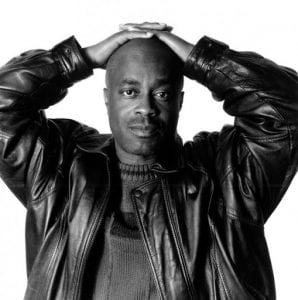
Charles Burnett, 76, received an honorary Academy Award in 2017 for his life’s work in film.
The Quad-Cities based Azubuike African American Council for the Arts is hosting the free event Jan. 18 at 6 p.m., where Azubuike executive director (and Rock Island native) Jonathan Burnett will interview his father, Academy Award-winner Charles Burnett, director of the new MLK documentary, and the story creator, Steven Cleveland, who teaches at California State University (East Bay) in the Department of Ethnic Studies.
“A King in Paradise” is a documentary film – now in pre-production and fundraising — that explores Dr. King’s untold journey, five days in Hawaii during September 1959, from a multi-generational perspective.
Monday’s talk will “shine a lot of light on what the production is actually about,” Jonathan Burnett (a Los Angeles-based filmmaker who runs the Q-C Urban Exposure Independent Film Project each summer) said this week. “I didn’t know Dr. King went to Hawaii in 1959.”
Charles Burnett, 76, said Wednesday that Cleveland has wanted to do this documentary for a long time, and asked him to direct, in part because Burnett directed the 1999 Disney TV film, “Selma, Lord, Selma,” about the civil rights movement seen through the eyes of a young girl. In that film, they did a reenactment of the famous 1965 march across the Edmund Pettus Bridge, in Selma, Ala., in which King wore a Hawaiian lei around his neck.
“Steven saw this picture, asked me to join him,” Charles Burnett said, noting they’ve interviewed some people who were in Hawaii during King’s 1959 visit.
“You’d be surprised how many people forget history,” Burnett said. “At Suffolk University, I was teaching at a conference about Nat Turner,
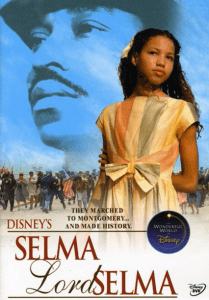
Charles Burnett’s 1999 docudrama, “Selma, Lord, Selma” told of the 1965 civil rights struggle through the eyes of a young girl.
there at the conference, there was a young lady there who didn’t have a clue who Rosa Parks was.”
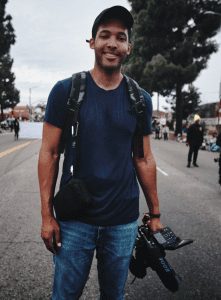
Rock Island native Jonathan Burnett is executive director of Azubuike African American Council for the Arts.
Many people remember the leis worn by Dr. King and others as they crossed the Edmund Pettus Bridge in Selma in 1965, but few know that the story began in 1959 as a part of Hawaii’s statehood celebration, Jonathan Burnett said. In partnership with From the Heart Productions, Cleveland’s new film will share the story of MLK’s first trip to Hawaii with a cohort of college students as they adventure to Hawaii to follow in MLK’s footsteps.
One of MLK’s historical moments in Hawaii was a speech that he gave to the First Hawaiian State Assembly that explored the truth about race in America. “By sharing MLK’s wisdom, the film will empower audiences in a time when the truth is masked, manipulated, and complex,” according to the Monday Facebook event page.
Cleveland was always impressed that King was always so popular in Hawaii, Jonathan said.
“What we just wanted to do is to for MLK Day, is to just make people aware that this documentary is happening, in honor of Dr. King on MLK Day. Azubuike as a nonprofit doesn’t have a role in raising the funds. Anything we can help is what we could do. It’s really just to understand, to get Charles Burnett in the room, so people can be exposed to him, and also Professor Cleveland, to tell us about the project.”
“I think they’re still raising funds, so they will extend that deadline,” Jonathan said. “It’s just difficult, especially during a pandemic.”
From Mississippi to an honorary Oscar
Born in Mississippi in 1944, Charles Burnett moved with his family to the Watts area of Los Angeles at an early age. In his bio at IMDB.com, he describes the community of having a robust mythical connection with the South as a result of having so many Southern transplants, an atmosphere which has informed much of his work. Burnett went to UCLA, where he earned his master’s in filmmaking.
In 1988, he received the prestigious John D. and Catherine T. MacArthur Fellowship (also known as the “genius grant”), which helped him support his young family and concentrate on his then, newest script. With Danny Glover parlaying his success in “Lethal Weapon,” they wrangled funding for the production of Burnett’s “To Sleep With Anger” (1990).
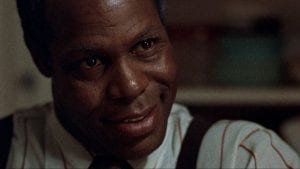
Danny Glover starred in Charles Burnett’s 1990 film, “To Sleep With Anger.”
Glover, playing a vaguely supernatural Southern trickster overstaying his welcome while visiting family, found perhaps his most critically acclaimed role. It won the 1991 Independent Spirit Awards for Best Director and Best Screenplay for Burnett and Best Actor for Glover.
The Library of Congress selected Burnett’s “Killer of Sheep” (1972) and “To Sleep With Anger” to be inducted into the National Film Registry. The National Society of Film Critics honored Burnett for best screenplay for “To Sleep With Anger,” making him the first African-American to win in this category in the group’s history.
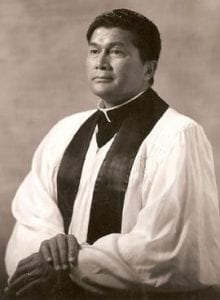
The Rev. Abraham Akaka was friends with King and head of the Hawaii Civil Rights Commission.
Time magazine wrote: “If Spike Lee’s films are the equivalent of rap music – urgent, explosive, profane, then Burnett’s movie is good, old urban blues.” The film also received a Special Jury Recognition Award at the 1990 Sundance Film Festival and a Special Award from the Los Angeles Film Critics Association. Both Burnett and Glover were nominated for New York Film Critics Circle Awards.
Burnett has been awarded grants from the Guggenheim Foundation, the Rockefeller Foundation, the National Endowment for the Arts and the J. P. Getty Foundation. He is also the winner of the American Film Institute’s Maya Deren Award, and one of the very few people ever to be honored with Howard University’s Paul Robeson Award for achievement in cinema.
The Chicago Tribune has called him “one of America’s very best filmmakers” and the New York Times named him “the nation’s least known great filmmaker and most gifted black director.” Burnett directed a documentary on Nat Turner and one chapter (“Warming by The Devil’s Fire”) of the six-part documentary, “The Blues,” a production of Martin Scorsese’s CPA Productions.
In November of 2017, Burnett received an honorary Academy Award for his life’s work.
From Hawaii to Selma
Charles Burnett’s “Selma, Lord, Selma” is a 1999 American made-for-television biographical drama based on true events that happened on March 7, 1965, known as Bloody Sunday in Selma, Alabama, in which future Congressman and civil rights leader John Lewis was beaten by police. The film tells the story of King through the eyes of an 11-year-old African-American girl.
Jonathan Burnett said this week that Martin Luther King’s wearing of leis for the iconic march two weeks later, from Selma to Montgomery, Ala., symbolized the universality of the cause.
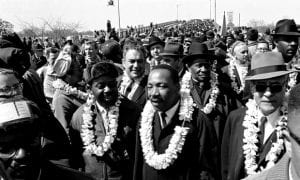
Martin Luther King, Jr. and other civil rights leaders wear Hawaiian lei as they march in Selma, Ala., on March 21, 1965.
“One thing the Edmund Pettus Bridge march showed was that what Dr. King was all about was solidarity across many people,” Jonathan said. “Showing that racial equality wasn’t just a black issue, a black and white issue; it was the issue of the country, as well as the issue of the world.
“And everyone had part in the struggle for racial equality,” he said. “I think he wanted to show solidarity.”
In 1959, after attending the National Baptist Convention in San Francisco and speaking in Los Angeles, King flew to Hawaii for several engagements and a brief vacation. Arriving just three weeks after Hawaii became the 50th state, he addresses the legislature at the state capitol.
Part of his speech on Sept. 17, 1959 said:
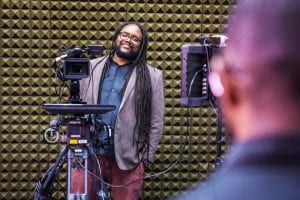
Professor Steven Cleveland teaches at California State University, in the Bay area.
“We are seeking to free the soul of America. Segregation debilitates the white man as well as the Negro. We are to free all men, all races and all groups. This is our responsibility and this is our challenge and we look to this great new state in our Union as the example and as the inspiration.
“As we move on in this realm, let us move on with the faith that this problem can be solved and that it will be solved, believing firmly that all reality hinges on moral foundations and we are struggling for what is right and we are destined to win,” he said. “We have come a long, long way. We have a long, long way to go.”
In that speech, King said: “I come to you with a great deal of appreciation and great feeling of appreciation, I should say, for what has been accomplished in this beautiful setting and in this beautiful state of our Union.
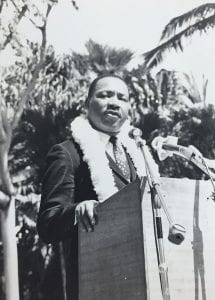
Rev. Dr. Martin Luther King, Jr. speaking in Hawaii in September 1959, soon after it became the 50th state in the U.S.
“As I think of the struggle that we are engaged in in the South land, we look to you for inspiration and as a noble example, where you have already accomplished in the area of racial harmony and racial justice, what we are struggling to accomplish in other sections of the country, and you can never know what it means to those of us caught for the moment in the tragic and often dark midnight of man’s inhumanity to man, to come to a place where we see the glowing daybreak of freedom and dignity and racial justice.”
The lei King and others wore in the March 21, 1965 march in Selma, Ala., were a gift from Rev. Abraham Akaka, a Honolulu minister and president of the Hawaii Civil Rights Commission.
In a March 19, 1965, letter, he wrote to Dr. King: “…as you bring good news to the meek, bind up those that are bruised, release the captives, our prayer and aloha reach out to enfold you. These flower lei were made by the mothers of the Kawaiahao church for you and our brothers in the cause of our Lord Jesus, whose commandment you obey.”
The two ministers had developed a friendship over the years bound by their belief in nonviolence and social justice, according to a 2016 article at hawaiimagazine.com.
King visited Hawaii a number of times during his life. Just a year before the Selma marches, he spoke at a Honolulu conference for the Hawaii State Human Rights Commission—the first committee of its kind in the United States—of which Rev. Akaka was a board member. King found the Islands’ multi-ethnic population and everyday society to be an
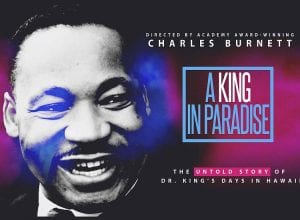 inspirational source of “racial harmony” as the struggle of African-Americans made headlines across the continental U.S., the magazine said.
inspirational source of “racial harmony” as the struggle of African-Americans made headlines across the continental U.S., the magazine said.
The lei themselves, however, were hand delivered by a five-person contingent who flew to Selma to participate in the iconic marches.
There is an online crowdfunding campaign to support making of the new documentary, at www.akinginparadise.com. They have so far raised $9,000 of a $100,000 goal.
“We are entering Phase #2 of our fundraising goal. Your tax-deductible contribution towards Phase #2 funding is crucial to helping us tell this little-known piece of MLK history with the world,” the site says.
“The second phase of fundraising for A KING IN PARADISE will enable our team to deliver a short film that will identify opportunities and strategic partnerships to support the project and market the story. These elements will allow us to bring this film to life. We can’t do this without you!”
“There are movies. And there are MOVEMENTS,” the site says. “A KING IN PARADISE seeks a higher level of connection with its audience to ensure that it remains relevant long after the film has been distributed. We are offering several Sponsorship Levels designed to inspire audience engagement.”
The Monday talk will be streamed on the Azubuike Facebook page.









